
ECONOMIC THEORY
Scope & Guideline
Shaping Tomorrow's Economic Discourse Today
Introduction
Aims and Scopes
- Theoretical Foundations of Economic Models:
The journal focuses on developing and refining theoretical models that explain economic behavior, market dynamics, and decision-making processes. This includes the study of equilibrium concepts, game theory, and the implications of different economic assumptions. - Interdisciplinary Approaches to Economic Problems:
Economic Theory encourages the intersection of economics with other disciplines, such as political science, sociology, and psychology. This interdisciplinary focus is evident in research that examines topics like political corruption, social preferences, and behavioral economics. - Dynamic and Stochastic Economic Analysis:
Research published in the journal often explores dynamic models and stochastic processes, addressing time-dependent behaviors and uncertainty in economic decision-making. This includes studies on economic growth, market fluctuations, and the impact of external shocks. - Normative Economics and Policy Implications:
The journal also engages with normative aspects of economics, evaluating the implications of economic theories for public policy and welfare economics. This includes discussions on taxation, public goods provision, and environmental policies. - Behavioral Insights in Economic Theory:
There is a consistent focus on incorporating behavioral insights into economic models, challenging traditional assumptions of rationality. This includes research on bounded rationality, learning, and social influences on decision-making.
Trending and Emerging
- Economic Implications of Pandemics and Crises:
Research exploring the economic impact of crises, particularly COVID-19, has surged. This includes studies on optimal lockdown policies, vaccination strategies, and the broader implications of public health on economic systems. - Behavioral Economics and Decision-Making:
There is a growing emphasis on behavioral economics, with research examining how psychological factors influence economic decisions. This trend includes studies on moral preferences, social influence, and bounded rationality. - Digital Economy and Information Economics:
The rise of the digital economy is reflected in increased research on topics such as information design, online platforms, and the economics of digital goods. This trend highlights the need to understand new economic interactions facilitated by technology. - Environmental Economics and Sustainability:
Emerging themes in environmental economics, particularly related to climate change and sustainability, are becoming more prominent. Research is increasingly focused on the economic implications of environmental policies and the design of sustainable economic systems. - Inequality and Economic Coordination:
Recent publications are increasingly addressing issues of inequality and its effects on economic coordination. This includes investigations into how inequality can influence collective decision-making and economic stability.
Declining or Waning
- Traditional Static Equilibrium Analysis:
Research focused solely on static equilibrium models has seen a decline as the field increasingly embraces dynamic and stochastic approaches. The growing recognition of the importance of time and uncertainty in economic modeling has led to a reduced emphasis on purely static analyses. - Overly Simplistic Models of Rationality:
There has been a noticeable decline in papers that rely on overly simplistic assumptions of rational behavior. As the field advances, researchers are moving toward more complex models that incorporate behavioral nuances and cognitive limitations of agents. - Limited Focus on Classical Economic Theories:
There is a waning interest in classical economic theories that do not adequately address contemporary economic challenges, such as inequality, climate change, and technological disruption. Researchers are increasingly looking for frameworks that can provide insights into these pressing issues. - General Equilibrium without Externalities:
The focus on general equilibrium models that ignore externalities is diminishing, as economic research increasingly recognizes the significance of external effects and market failures in shaping economic outcomes.
Similar Journals
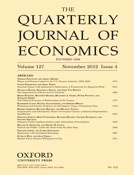
QUARTERLY JOURNAL OF ECONOMICS
Pioneering Insights in Economics and EconometricsQUARTERLY JOURNAL OF ECONOMICS is a prestigious and long-established academic journal published by Oxford University Press Inc. With its origins dating back to 1886, this esteemed journal has continually provided a vital platform for the dissemination of cutting-edge research in the field of economics and econometrics. The journal holds an impressive Q1 ranking in the Economics and Econometrics category, positioning it at the forefront of scholarly contribution with a Scopus rank of #2 out of 716, reflecting its standing in the top 1% of the field. Although the journal is not open access, it offers a wealth of vital resources and insights that are indispensable for researchers, professionals, and students alike, as it aims to advance knowledge and influence economic policy and practice through rigorous academic inquiry.

REVUE ECONOMIQUE
Advancing Knowledge in Economics and FinanceREVUE ECONOMIQUE, published by PRESSES FOND NAT SCI POLIT in France, is a distinguished academic journal with an ISSN of 0035-2764 and an E-ISSN of 1950-6694. Established in 1974, the journal has evolved significantly over the years, focusing on a diverse range of topics within the field of economics, econometrics, and finance. With its commitment to presenting in-depth research and innovative perspectives, REVUE ECONOMIQUE serves as a vital resource for scholars, professionals, and students seeking to enhance their understanding of economic theories and practices. Although it is currently categorized in the Q4 quartile, ranking 241 out of 288 in the field, the journal aims to foster new dialogues and disseminate valuable insights that contribute to the economic discourse. The journal is not available as open access, but its rich repository of articles continues to attract readers interested in the complexities of economic dynamics. For more information, you can refer to their address at 27 RUE SAINT-GUILLAUME, 75341 PARIS 07, FRANCE.
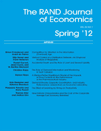
RAND JOURNAL OF ECONOMICS
Elevating the Standards of Economic ResearchRAND JOURNAL OF ECONOMICS, published by Wiley, is a prestigious peer-reviewed journal that has been a cornerstone in the field of economics since its inception in 1984. With a focus on empirical and theoretical research, it aims to bridge the gap between economic theory and real-world application, providing insights that are both rigorous and relevant. The journal holds an impressive Q1 ranking in Economics and Econometrics, reflecting its significant impact and influence in the field, evidenced by its Scopus rank of #199 out of 716 in related categories. Although it does not offer open access, the journal remains accessible to a broad audience through institutional subscriptions. Researchers, professionals, and students will find RAND JOURNAL OF ECONOMICS an invaluable resource for cutting-edge economic analyses and a vital platform for scholarly dialogue about contemporary economic issues.

Theoretical Economics
Catalyzing Dialogue in the World of Economic TheoryTheoretical Economics, published by the Econometric Society, is a premier open-access journal dedicated to advancing the field of economics through rigorous theoretical analysis. With an ISSN of 1933-6837 and an E-ISSN of 1555-7561, this journal has been at the forefront of economic scholarship since its inception. Operating out of New York University, it holds a prestigious Q1 ranking in the category of Economics, Econometrics, and Finance, reflecting its influential contributions to the discipline. By making research freely accessible since 2006, Theoretical Economics not only fosters a broader dissemination of knowledge but also promotes collaborative dialogue among economists worldwide. The journal's convergence years span from 2007 to 2024, ensuring ongoing relevance in a rapidly evolving field. Researchers, professionals, and students alike will find Theoretical Economics an essential resource for staying informed about cutting-edge theoretical advancements in economics.
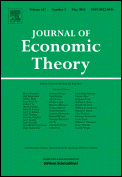
JOURNAL OF ECONOMIC THEORY
Shaping Tomorrow’s Economic Theories TodayThe JOURNAL OF ECONOMIC THEORY, published by Academic Press Inc Elsevier Science, stands as a paramount platform for disseminating groundbreaking research within the field of economics and econometrics. With an impressive history dating back to 1969 and a convergence period extending to 2024, this journal has continually shaped the academic discourse around critical economic theories and methodologies. Currently recognized in the top quartile (Q1) of its category for 2023, it ranks prominently among its peers, boasting an impactful scholarly contribution reflected in its Scopus ranking—positioned at #348 out of 716 journals in the domain. Although it does not offer Open Access, the journal provides an essential resource for those seeking to enhance their understanding of complex economic models and strategies. Researchers, professionals, and students alike will find the JOURNAL OF ECONOMIC THEORY to be an invaluable asset for their academic and professional pursuits in the rapidly evolving landscape of economics.

THEORY AND DECISION
Catalyzing Interdisciplinary Research to Drive Effective Decision-MakingTHEORY AND DECISION is a prestigious academic journal published by SPRINGER, which has been a cornerstone of interdisciplinary research since its inception in 1970. With an ISSN of 0040-5833 and an E-ISSN of 1573-7187, this journal offers valuable insights into a range of fields, including Applied Psychology, Decision Sciences, Economics, and more. Holding a remarkable position within various quartile rankings, such as Q1 in Arts and Humanities and Q2 in Economics, it signifies the journal's impact and relevance in modern academic discourse. Although not presently open access, it remains accessible to researchers and institutions that prioritize impactful studies and theoretical advancements. The journal's objectives include exploring decision-making processes and theoretical underpinnings that inform practical applications across disciplines, making it an essential resource for academics, professionals, and students dedicated to advancing knowledge in their respective fields. THEORY AND DECISION continues to shape the landscape of interdisciplinary research, providing a platform for innovative ideas and discussions that are crucial in today’s complex world.
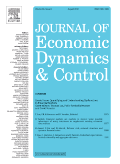
JOURNAL OF ECONOMIC DYNAMICS & CONTROL
Unveiling Insights in Applied Mathematics and EconometricsJOURNAL OF ECONOMIC DYNAMICS & CONTROL, published by Elsevier, is a distinguished scholarly journal that has established itself as a leading outlet in the fields of applied mathematics, control and optimization, and economics and econometrics since its inception in 1979. With its notable Q1 categorization in 2023 across these disciplines, this journal provides a platform for innovative research that propels theory and practice in dynamic systems and control processes. Researchers, professionals, and students can engage with cutting-edge studies that explore complex economic models and their real-world applications. Although the journal does not offer open access, it remains a vital resource for those aiming to stay informed of the latest advancements in economic dynamics and control methodologies. The journal’s commitment to high-quality research and its impressive standing—ranked in the top percentiles within Scopus categories—underscore its importance and influence within the academic community.
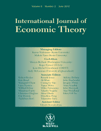
International Journal of Economic Theory
Pioneering insights in the realm of economic theory.International Journal of Economic Theory, published by Wiley, serves as a vital platform for scholars and researchers in the fields of economics and econometrics. With its ISSN 1742-7355 and E-ISSN 1742-7363, this journal focuses on advancing theoretical understandings in economics, providing a comprehensive analysis of contemporary economic issues. The journal has been converging knowledge and innovation since its inception in 2009 and continues to sustain a commitment to high-quality research until 2024. As a Q3 journal in the 2023 category rankings, it ranks in the 21st percentile in Scopus for Economics and Econometrics, reflecting its established presence amidst competitive scholarly discourse. Although it is not open access, the journal is widely accessible through institutional subscriptions, facilitating learning and research for professionals, graduate students, and academic leaders. The International Journal of Economic Theory is pivotal for those looking to contribute to economic thought, ensuring that emerging theories find a respected outlet in the global academic landscape.
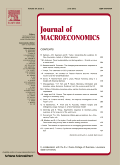
JOURNAL OF MACROECONOMICS
Charting the Course of Macroeconomic ThoughtJOURNAL OF MACROECONOMICS, published by Elsevier, stands as a significant platform for scholarly discourse in the field of economics and econometrics. With an ISSN of 0164-0704 and an E-ISSN of 1873-152X, this journal has been actively contributing to the academic community since 1979 and continues to publish impactful research through 2024. It is recognized within the Q2 category for Economics and Econometrics in its 2023 quartile rankings, and it holds a respectable Scopus ranking of #353 out of 716 in its field, placing it in the 50th percentile. Despite not being an open-access journal, it provides valuable insights into macroeconomic theories, empirical assessments, and policy implications, making it an essential resource for researchers, professionals, and students aiming to deepen their understanding of macroeconomic dynamics. To access a breadth of contemporary research and enhance your academic pursuits, consider diving into the latest issues of this esteemed journal, conveniently located in Amsterdam, Netherlands, at RADARWEG 29, 1043 NX.

EXPERIMENTAL ECONOMICS
Exploring behavioral finance with rigorous experimental designs.EXPERIMENTAL ECONOMICS is a leading journal dedicated to the advancement of knowledge in the field of economic experimentation and behavioral finance. Published by SPRINGER, this esteemed journal plays a pivotal role in disseminating high-quality research that explores the intersection of economics and experimental methodology. With an impressive Q1 ranking in the category of Economics, Econometrics and Finance (miscellaneous) and a Scopus rank of #52 out of 242, it stands out as a premier outlet for innovative scholarship. Although it operates under a subscription model, the journal is committed to providing its readership with insights into rigorous experimental designs and their applications in economic theory and practice. Researchers and practitioners alike can benefit from its extensive array of studies, contributing to the ongoing dialogue and development within the economic landscape. Covering a scope that converges from 2003 to 2024, EXPERIMENTAL ECONOMICS is not just a repository of knowledge but a catalyst for new ideas, thereby inviting professionals, students, and scholars to engage with cutting-edge research that shapes the future of economics.